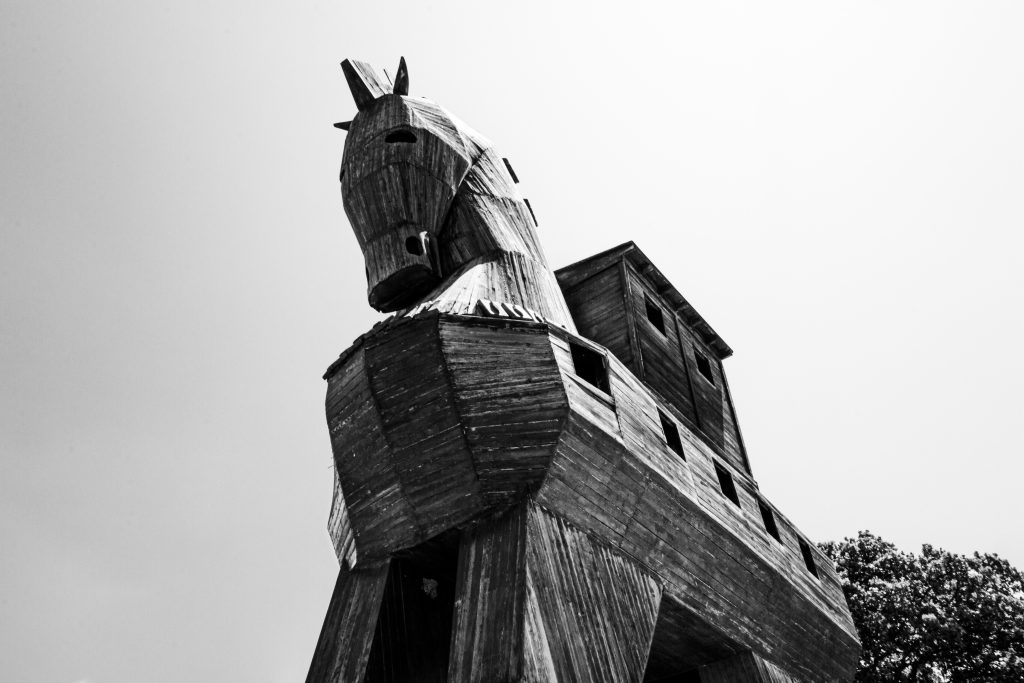
Fiona McLean
5 July 2022
In the Aeneid, Virgil relates the legend of the Trojan Horse. The Greek army, seeking to find a way to infiltrate the city of Troy, pretends to sail away, leaving a giant horse as a votive offering. The unsuspecting Trojans pull it into their city as a victory trophy, but hidden inside are Greek soldiers, who creep out at night, let the returning army into Troy, and thus defeat Troy. The Trojans had been seduced by something which looked attractive and valuable, but which turned out to be destructive and dangerous.
In our Anglican context, we are being offered a Trojan horse – that of tolerance. This looks attractive. We are flattered to think that we are generous, inclusive, open-minded people. But, like the one in Troy, this Trojan horse is destructive and dangerous. It will defeat us from within unless it is recognised and resisted.
Read more: Future of same-sex marriages may be left to individual dioceses: Melbourne leaders
Of course, Anglicans should be tolerant, patient, sympathetic and willing to listen to others. We must think hard about how to live as Christians in our context, as we face new challenges and seismic shifts in society, including secularism, apathy, and changed ideas about gender and sexuality. The church looks different in 2022 in Australia from how it did in the past.
But there must be some limits to how much we change and how much we tolerate, or we will lose our identity as Christians and as Anglicans.
All agree that we should not tolerate some things. We do not tolerate embezzlement or adultery or plagiarism. As affirmed at General Synod, we do not tolerate child abuse or family violence.
So how, then, do we work out what to endorse and what to oppose?
Some see the creeds as the litmus test: a definitive guide that means whatever is not mentioned in the creeds is a matter of conscience. But issues like family violence and child abuse are not mentioned in the creeds, yet we don’t tolerate them. Our faith is not limited to the creeds but includes the Bible, on which they are based.
Another line of argument is that the Church should be more tolerant in order to better reflect the society around us, that Christians should strive to be relevant and accessible. There is some truth in this. For example we read in 1 Corinthians 9 that Paul was willing to become like a Jew, or like those not having the law, to help them come to faith in Jesus. But our ultimate authority cannot be the society around us. As Christians, we are called to be salt and light – distinctively different, even at times profoundly out of step with societal norms. We live in a context where many people see Christianity as not just weird and irrelevant, but harmful and oppressive. If we were to conform entirely to society, we would stop being Christian.
Read more: To achieve Anglican unity, there is one single place we can start
These points of view find expression in what some (such as Archbishop Phillip Aspinall of Brisbane) call “comprehensive” Anglicanism. Supporters of this view suggest that we should allow for a diversity of views in our national church while we wait for God’s leading on the vexed issues that confront us. This “comprehensive” Anglicanism is presented as inclusive, broad, rich, tolerant. But comprehensive Anglicanism becomes incomprehensible when it is so broad that it seeks to embrace fundamentally irreconcilable points of view, or when it lacks appropriate boundaries which help us work out what we as Anglicans must embrace and what we must reject (cf. Titus 1:9). I am reminded of Jesus’ warning in Matthew 7:13-14 that “wide is the gate and broad is the road that leads to destruction”.
What, then, is another way forward?
Firstly, we need to recognise that the appeal to embrace diversity has its dangers. There is good diversity in the Bible, seen in the glorious vision shown to the apostle John in Revelation 7, of “a great multitude that no one could count, from every nation, tribe, people and language, standing before the throne and before the Lamb”. It is also seen in the wonderful diversity of gifts that the Holy Spirit gives his people which we read of in Scripture such as 1 Corinthians 12 and Romans 12. There is a diversity of culture, gifts and people which enriches the church and is to be celebrated.
But other kinds of diversity are not good. Some behaviours and attitudes and identities are incompatible with being a Christian. The Corinthians weren’t commended for tolerating “the old yeast” of sin, but warned that some behaviours, such as idolatry, reviling and greed, were incompatible with belonging to Christ in 1 Corinthians 5-6. Paul didn’t rejoice in a diversity of views over whether or not to eat with Gentiles, instead, in Galatians 2:10, he publicly “opposed [Cephas] to his face”. In Revelation 2 and 3, the churches are not commended for tolerating the practices of the Nicolaitans, the teaching of Balaam or the so-called prophet Jezebel, who mislead God’s people into sexual immorality, instead they are sharply rebuked.
As Anglicans, we need to embrace good forms of diversity, while rejecting the kind of unhelpful diversity that undermines God’s church.
Secondly, being tolerant does not mean abandoning our convictions. Being a Christian – in fact, holding any convictions at all – means affirming some things and rejecting some things. As Christians, we believe that Jesus is the only way to God: this may well be seen as profoundly insulting to Muslims, atheists, and others. When we affirm each Sunday that Jesus died and rose again, we are implicitly saying that those who don’t believe in the resurrection are wrong. We can hold to our convictions in a way that is insulting or arrogant and insensitive, or we can hold to them humbly and pastorally: but hold to them we must, or we compromise Christ.
Thirdly, it is foolish to be endlessly open-minded. It is important to listen, but, as GK Chesterton said, “The object of opening the mind, as of opening the mouth, is to shut it again on something solid”. It is possible to listen genuinely and compassionately to someone and yet still disagree with them. And, while we need to listen to others, we need to listen to God’s word above all. God’s people were repeatedly condemned in the Old Testament for failing to listen to God, such as in 2 Kings 17. Likewise in 2 Thessalonians 2 Paul urges us to listen to God’s teaching: “So then, brothers and sisters, stand firm and hold fast to the teachings we passed on to you, whether by word of mouth or by letter”.
Read more: Motion urging ‘meaningful dialogue’ easily passed by Melbourne synod
Fourthly, be aware that, in every generation, every context, there will be particular temptations to turn away from God’s word. Francis Schaeffer’s warning is worth repeating here:
[T]he Christian must resist the spirit of the world in the form it takes in his own generation. … It is our generation of Christians more than any other who need to heed these words attributed to Martin Luther: “If I profess with the loudest voice and clearest exposition every portion of the truth of God except precisely that little point which the world and the devil are at that moment attacking, I am not confessing Christ, however boldly I may be professing Christ. Where the battle rages, there the loyalty of the soldier is proved, and to be steady on all the battlefield besides, is mere flight and disgrace if he flinches at that point”.1
What we should tolerate and what we should refuse to tolerate must be determined by God. We need to keep listening to and obeying his word, the Bible. We are being offered a Trojan Horse of ungodly tolerance. It looks attractive, it makes us feel good about ourselves, and it seems to avoid conflict. But it is dangerous and undermines our identity as Anglicans. If you tolerate everything, you end up standing for nothing.
Fiona McLean is a member of General Synod and was re-elected to Standing Committee of General Synod. She also serves on Melbourne’s Archbishop in Council, on the Executive of the New Cranmer Society, and on the Gafcon Australia Board.






